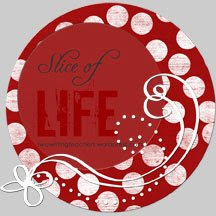Slice of Life Story - Lost For Words
 Today I bought a new book from Dymocks book store and in the introduction I read the following:
Today I bought a new book from Dymocks book store and in the introduction I read the following:“Language tells us who we are: because we are the words we use. If we adopt the language of another society we lose our rights to memory in our own kingdom “
These words belong to social anthropologist and author, Hugh Lunn. They are taken from his book, ‘Lost For Words.’ Hugh Lunn, is fearful that we are in danger of losing our language identity; that language is becoming increasingly homogenized and simplified. I fear he may be correct.
We know from experience that language is ever changing and evolving, but television speak has stunted our range of language terms. Shades of meaning have been reduced. Many people are now content to use a few stock phrases to get by. They figure it saves time, I guess. These have replaced a plethora of words and sayings that were once a feature of conversation with colourless grabs. Terms like whatever, tell someone who cares, get over it or get a life have become universal. Our conversational language has become simpified like standardization in the fast food industry.
The rich and colourful terminology once spoken has been replaced by evasive, non descript utterings. You still hear rich phrases used in conversation, but generally they have fallen from favour. They have become language relics.
Let me explain what I mean. My mother gave me great advice over the years. The best of it usually came during those times when I was catastrophising. – love that word.
I would be working myself into a lather and she might offer such rich gems as:
No use crying over spilt milk
These things are sent to try us
Never mind, you’ll survive
Think about the poor people in China. They'd love to have what you have
It's just a scratch, you'll be fine in no time
Nobody likes a whinger Dick
Let's be grateful for small mercies
Let’s cross that bridge when we come to it
We’ll just have to make do with what we have
We’ll just have to start again won’t we?
Today I might hear the simple generic utterance –‘Get a life.’ It is most apparent that expressions have become inhibited.
I find myself using terms and phrases from my childhood that draw blank expressions from generations that have somehow missed out on this amazingly rich expression. Today words such as ‘like,’ ‘nasty’ and ‘puh-leese’ act as conversational glue. Terms as such as ‘Bring it on’, ‘Oh my God’, and ‘In your dreams’ are heard ad nauseum. This style of talk is abbreviated, dismissive and all too common. I believe the idiom has suffered at the hands of modern culture and television’s dumbing down effects.
Over the years I have made a point of collecting in my notebooks expressions that are expressive and original. From my travels around the world, I present the following examples:
“My mother-in-law has a look that could burn holes in the lawn.”
“I feel as welcome as a skunk at a garden party.”
“Stop your gum thumping!”
“That’s okay, you can be the designated basket-case”
“He’s got all the direction of a blow fly in a bottle!”
“He couldn’t hit the side of a barn with a bagful of wheat!”
“You can’t make strawberry jam out of manure”
“That’s better than getting a slater up your nose.”
I think of all the alternative terms that were once used just to explain something that was 'considered 'good' Words such as ripper, corker, beauty, pearler, humdinger, ripsnorter, bobbydazzler, cracker, and bottler were once commonly heard synonyms in school playgrounds. So many of them have faded from conversation. They have gone down the gurgler!
It is not merely nostalgia that makes me long for this rich and colourful use of language. I am concerned that future generations may miss out on this expressive language as we increasingly adopt a generic kind of communication. We’ll no longer value such wonderful terms as dunderhead, dingbat, nong and ninny.
People will stare in utter disbelief when I attempt to describe someone as being ‘a few sandwiches short of a picnic.’ I know I’ll be down in the dumps and feeling as miserable as a bandicoot when that happens. Forgive my bellyaching, I’m just being a grizzleguts and like Hugh Lunn, I too am lost for words.





Comments
Post a Comment